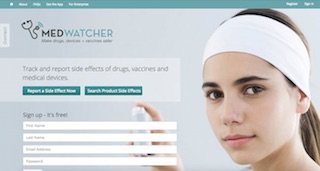 MedWatcher, from Epidemico.
MedWatcher, from Epidemico.
We've written before about Epidemico, a startup that grew out of the Boston Children's Hospital's work on combing social media for medical and health data. Today at the Health 2.0 conference in Santa Clara, California, Greg Powell, director of pharmacovigilance at GlaxoSmithKline, talked about how the pharma company uses the data it collects from its partnership with Epidemico.
"People really are communicating a lot online on social media," Powell said. "There’s actually a wealth of information here that potentially hasn’t been tapped into until recently. The question is 'If people are talking about our products, should we be listening to what they’re saying?' The answer is 'Of course'."
GlaxoSmithKline collected data about public postings on Twitter and Facebook that mentioned any of a list of 1,000 of the companies drugs. Altogether, they found more than 6 million hits on Twitter and more than 15 million hits on Facebook.
"To put that in perspective, there’s more adverse events discussions online, in social media, in one year than there are in the FDA database since it started in 1968," Powell said.
Epidemico helps GSK to filter that data, eliminate the noise posts, de-identify it (which importantly helps GSK get around FDA reporting requirements) and standardized the language around things like drug names and medical conditions.
The company uses the data more or less the same way it uses drug safety and usage data from other sources, Powell said: it gets turned over to the drug safety team, which identifies trends and takes action if necessary. In at least one case, Facebook postings monitored through this initiative directly led to a recall of an over-the-counter offering in Australia that had a manufacturing defect.
But sometimes social media turns out data that's not really like anything pharma companies have ever had access to before. For instance, the company has come across rich sources of information about how people are abusing their drugs.
"There are three websites particularly rich in abuse data," he said. "What people are doing on these websites is they’re actually coordinating clinical trial activities on abuse. They want to abuse drugs, get the maximum high out of it, and they don’t want to kill themselves doing it. So what they’re doing is they’re actually going in and telling people and coordinating, collecting data on the highs they get, collecting safety data, and then communicating to the abuse community how to abuse the drug."
This can help the company make its drugs harder to abuse, and it's information that simply doesn't exist elsewhere.
"People don’t call their pharmaceutical companies and say 'This is how I’m abusing your drug'," he said. "They don’t go into their medical records and say 'Can you add in that I’m snorting Bupropion?'”
The data can also be unexpectedly rich in helping compare adverse events to benefits of the drug. Twenty-nine percent of drug mentions the company has tracked mention the benefits patients received and 16 percent contextualize benefits around adverse events -- as in "this drug gave me a migraine, but it was worth it". Eleven percent of postings compared the drug to other treatment options.
Listening in on social media also helps GSK take the pulse on how well they're communicating to their patients. By looking at the 6 percent of mentions that were information seeking, the company can identify information it isn't presenting well.
In addition to the GSK presentation, Tim Fitzgerald, a Director in Merck’s Center for Observational and Real-World Evidence spoke at the event about how his company has used data from PatientsLikeMe. While GSK used social media data for postmarket research, Merck used PatientsLikeMe to do premarket research on Belsombra, an insomnia drug.
"Belsomra was launched in February of this year," Fitzgerald said. "I did this project prior to launch with the idea to try to get a gauge on what is working, what is not working with the generic medications. To get an idea of what are patients saying about the drugs as far as their satisfaction. And then get into what are their sleep outcomes."
What Merck found by examining data from the 90,000 insomnia patients on PatientsLikeMe was that even patients who tell their doctor they're satisfied with their sleep medication are often continuing to have sleep problems. The benefits of existing drugs tended to decline over time and, most interestingly, people said the drugs worked to help them get to sleep, but didn't keep them from waking up in the middle of the night.
The value proposition for Belsomra addressed some of these problems: it was designed to work over the long term for chronic insomnia, and to help people sleep the whole night. The data, Fitzgerald said, helped Merck to decide how best to market the drug.
At this same session last year, Genentech shared details about their partnership with PatientsLikeMe and other patient communities, and how they were using those insights.












